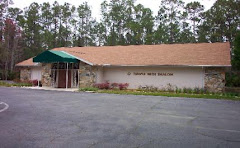
The opening days of the Festival of Sukkot, the basis for the American celebration of Thanksgiving, will be celebrated at special services on Thursday morning and Friday morning, September 27th and 28th. All morning services begin at 9:15 a.m. and are followed by Kiddush refreshements. All are welcome to attend.
The Festival of Sukkot begins on Tishrei 15, the fifth day after Yom Kippur. It is quite a drastic transition, from one of the most solemn holidays in our year to one of the most joyous. Sukkot is so unreservedly joyful that it is commonly referred to in Jewish prayer and literature as Z'man Simchateinu ![]() , the Season of our Rejoicing.
, the Season of our Rejoicing.
Sukkot is the last of the Shalosh R'galim (three pilgrimage festivals). Like Passover and
Shavuot , Sukkot has a dual significance: historical and agricultural. Historically, Sukkot commemorates the forty-year period during which the children of Israel were wandering in the desert, living in temporary shelters. Agriculturally, Sukkot is a harvest festival and is sometimes referred to as Chag Ha-Asif ![]() , the Festival of Ingathering.
, the Festival of Ingathering.
The word "Sukkot" means "booths," and refers to the temporary dwellings that we are commanded to live in during this holiday in memory of the period of wandering. The Hebrew pronunciation of Sukkot is "Sue COAT," but is often pronounced as in Yiddish, to rhyme with "BOOK us." The name of the holiday is frequently translated "Feast of Tabernacles," which, like many translations of Jewish terms, isn't very useful. This translation is particularly misleading, because the word "tabernacle" in the Bible refers to the portable Sanctuary in the desert, a precursor to the Temple, called in Hebrew "mishkan." The Hebrew word "sukkah" (plural: "sukkot") refers to the temporary booths that people lived in, not to the Tabernacle.
Sukkot lasts for seven days. The two days following the festival,Shemini Atzeret and Simchat Torah are separate holidays but are related to Sukkot and are commonly thought of as part of Sukkot. Shemini Atzeret worship at Temple Beth Shalom begin at 9:15 a.m. Thursday, October 4th and include the traditional Yizkor Memorial Service. Simchat Torah services will begin at 7 p.m. on Thursday, October 4th and continue at 9:15 a.m. on Friday, October 5th.
The festival of Sukkot is instituted in Leviticus 23:33 et seq. No work is permitted on the first and second days of the holiday. Work is permitted on the remaining days. These intermediate days on which work is permitted are referred to as Chol Ha-Mo'ed, as are the intermediate days of Passover.

No comments:
Post a Comment